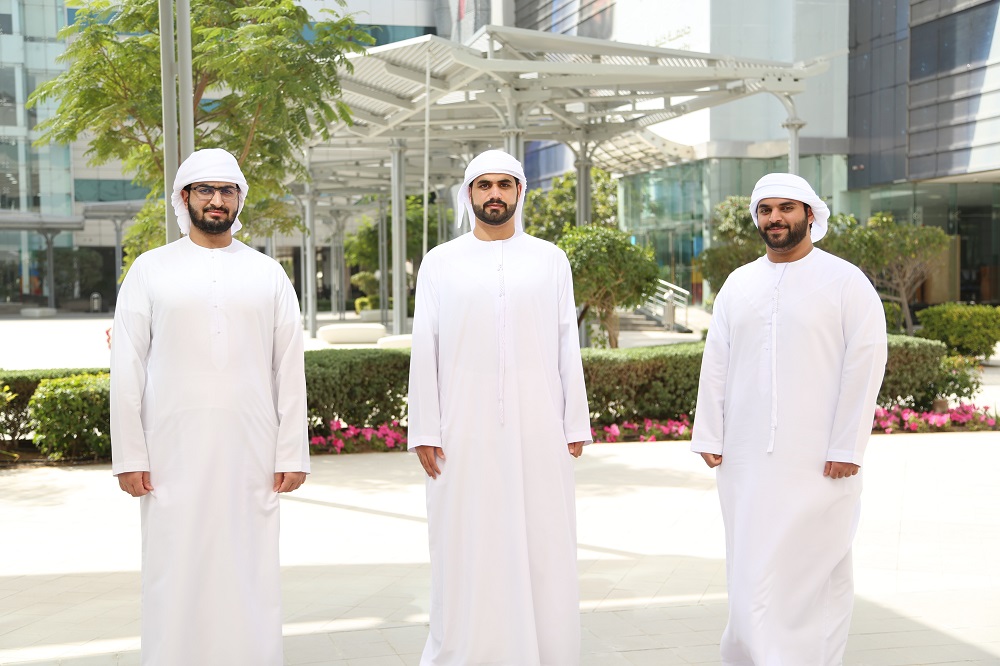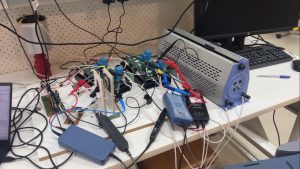
A team of four Electrical Engineering and Computer Science senior students have won 2nd place at the 15th IEEE UAE Student Day 2021 competition in the category “Senior Design Project – Power and Renewable Energy,” for their innovative electric vehicle wireless charging system. The Competition took place virtually on 6 November 2021.
The 7kW multi-coil wireless charging system the team designed was based on a thorough research/literature review of wireless charging systems. The team studied the various compensation strategies, selected the best compensation strategy, modeled and designed the wireless charging system, verified it through computer simulation, and finally built an experimental prototype.
The team included senior students Faris Alazzani, Esmaeil Alhajeri, Ali Alzaabi, and Saeed Al Qubaisi. They were supervised by Dr. Balanthi Beig, Associate Professor, Dr. Khaled Al Jaafari, Assistant Professor, and Dr. Khalid AlHammadi, Assistant Professor, all from KU’s EECS Department. Dr. Nazar Ali, Associate Professor of EECS is the course instructor.

“Participating in such competitions motivates students to work hard, and winning 2nd place encourages us to develop our project further,” Faris, the Team Leader, shared.
“Since the sky’s the limit at Khalifa University, we will do our best to participate in more competitions and conferences with our project and aim for first place. Many thanks to Khalifa University and the EECS department for giving us this opportunity to participate in this competition and for providing all the equipment we needed to develop and test our system. Moreover, many thanks to our supervisor Dr. Balanthi Beig. He supported us from the beginning and he encouraged us to participate in this competition. Lastly, we are thankful to our supervisors Dr. Khaled Al Jaafri and Dr. Khalid Al Hammadi, and to researchers Dr. Ahmed Shehada, Dr. Motiur Mohammed and Mr. Nguyen The Hoach for their help in the lab. We would also like to thank Dr. Shihab Jimaa, Associate Professor of EECS and KU coordinator of the IEEE Student competition for his encouragement.”
The KU multi-coil wireless EV charging system consists of a rectifier with capacitor filter – a device which converts an alternating current (from the Abu Dhabi Distribution Company’s distribution supply socket at 230 volts and 50 Hertz), into a direct current.
Then this DC power is converted to 85 kilohertz high frequency AC using a silicon carbide-metal-oxide-semiconductor field-effect transistor (SiC-MOSFET) based DC to AC converter.
This high frequency AC power is then transmitted wirelessly through a magnetic field using transmitter and receiver coils.
The electric vehicles are fitted with receiver coils and the high frequency AC signal is converted to DC using another high frequency rectifier. This DC is then used to charge the car battery.
The KU students selected the series compensation strategy after conducting a thorough literature review. In the first stage, they modelled and designed a wireless charging system based on a single coil arrangement. Through simulation studies, they found that the energy transfer is reduced due to misalignment and the distance between transmitter and receiver coil. To increase energy-transfer efficiency, three coils were used at the transmitter end. The design was then verified through computer simulation using MATLAB/SIMULINK software.
The team then fabricated a scaled down experimental prototype and successfully tested it at the power electronics and sustainable energy research lab in KU’s Advanced Power and Energy Center.
Erica Solomon
Senior Publication Specialist
20 December 2021